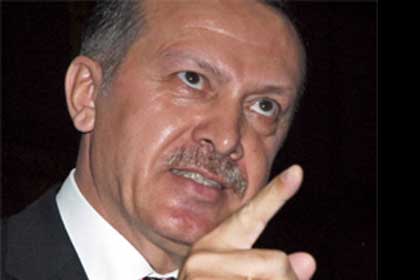 Prime Minister ErdoganOn Wednesday, Ankara said that it was closing its three border posts with Syria to traffic, except for the flight of Syrians into Turkish territory. Meanwhile, having received news of a "successful" outcome from another military operation against the Kurdish insurgency PKK, Prime Minister Recep Tayyip Erdogan has declared that he is sending Foreign Minister Ahmet Davutoglu to Erbil in Iraqi Kurdistan. At the same time, Erdogan dismissed the recent statements of the Iraqi Kurdistan Regional Government’s President, Massoud Barzani:
Prime Minister ErdoganOn Wednesday, Ankara said that it was closing its three border posts with Syria to traffic, except for the flight of Syrians into Turkish territory. Meanwhile, having received news of a "successful" outcome from another military operation against the Kurdish insurgency PKK, Prime Minister Recep Tayyip Erdogan has declared that he is sending Foreign Minister Ahmet Davutoglu to Erbil in Iraqi Kurdistan. At the same time, Erdogan dismissed the recent statements of the Iraqi Kurdistan Regional Government’s President, Massoud Barzani:
Our Foreign Minister...will go and convey our sensitivity at the highest level. The situation has come to a different point now. How unpleasant this statement [from Barzani] that "we gave them [Syrian Kurds who fled from the army] training in northern Iraq and sending them back" and this shows that this situation is going through different dimensions.
Erdogan clearly wants Barzani to see Ankara's "red line" against an organic link between Iraqi Kurdistan and Syria's West Kurdistan region. But how to enforce that red line? Cutting down on oil from the Iraqi Kurds?
Or maybe aligning with the Free Syrian Army and the Syrian National Council against the Kurdish front --- on Tuesday, Davutoglu received the SNC head Abdelbasset Sida in Ankara, and the FSA has made statements that they will not let Kurds declare independence or autonomy after the Assad regime is toppled.
For all Ankara's tough talk, It is hard to believe in such a scenario for two reasons.
First of all, both the SNC and the FSA know well that they have to negotiate with the Kurdish presence. In most of the West Kurdistan region, Kurds have seized government institutions and protected their people. Even in the biggest Kurdish city, Qamislo, Syrian forces control the gates but Kurds patrol inside them.
Secondly, the Kurdish movement inside Syria has reached a point where it cannot retreat into itself as if nothing had happened, given Barzani’s role in establishing the High Kurdish Council that united the People's Assembly and Kurdish National Council; the long experience of isolation under the Assad regime, which denied their identity and considered them as “foreigners”; and the militant PKK’s close ties with Syrian groups.
The Barzani Factor
On Tuesday, it was claimed that trained Kurds were being sent from Iraq to Qamislo,with a video showing unarmed soldiers’ advancing on foot. Barzani, even before Erdogan’s criticism, denied such news and said that it was an internal problem of Syria and its peoples.
If so, then why are Kurdish forces being gathered and trained? Is this for a worst-case scenario to despatch them in case of a serious conflict between Syrian Kurds and other forces? Is Barzani manoeuvring for leadership in Syria as well as Iraq?
Still, just as Ankara’s is limited in ability to derail the Kurdish nationalist movement, particularly while that movement is beyond its military and police control, Barzani’s influence over West Kurdistan is also restricted. In the end, he can only serve as a model for Syrian Kurds while establishing organic ties that will benefit both sides.
A Diversion from Reality
At the end of the day, whatever the fate of the Assad regime, Ankara has to face the Kurdistan reality and the importance of a solution of their own Kurdish problem. Given a stronger PKK and a more demanding opposition party BDP on the streets, the Erdogan Government will be pushed to the edge of its rule unless it recognizes this.
For now, apart from preparing his foreign minister for his Erbil visit, Erdogan is looking for every option to make the Turkish public forget the growing importance of the Kurdistan reality. Even as both the Israeli Prime Minister Benjamin Netanyahu and his Foreign Minister Avigdor Lieberman said that they would like to restore a relationship --- of course without accepting Ankara’s demand to apologise for past actions --- Erdogan brought Hamas’s Khaled Meshaal to Ankara. Why? Because the Turkish Prime Minister wanted to give a second shoulder to the new Egyptian track for negotiation between Ramallah and Gaza.
There was the Iran front, with Turkey displaying itself as broker for the next round of talks between Tehran and the 5+1 Powers. And on Wednesday evening, a domestic concession --- students would no longer pay state university fees.
Finally, rather than mentioning Kurdistan and the pressure for negotiation, the Government stroked Turkish pride. On Wednesday evening, Foreign Minister Davutoglu said:
We are never going to pursue a wait and see policy [for Syria]. We neither become silent to violence nor pursued a wait and see policy. We picked our own original policy and pursuing it.
We are doing exactly what we did in Tripoli, Yemen, Balkan wars a century ago. Whatever walls they want to put between us and these people, we are determined to bring down. Those ones who carry an ideal in mind and a goal in hear will be successful. If you cannot change the world, if you have no voice, then there is no point of doing politics, foreign policy.